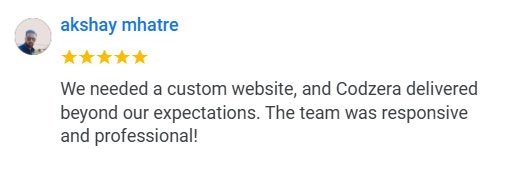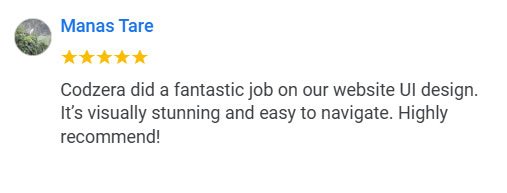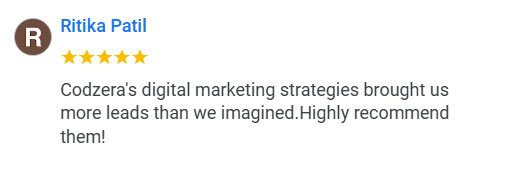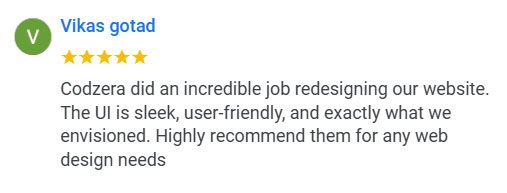Laravel Website Development Company in Mumbai, India
Secure Your Web Presence with Our Laravel Development Services and Expertise
Get a Free QuoteScalable and Secure Solutions for Complex Web Applications
Mumbai’s digital landscape is booming. Companies need top-tier websites to compete. Connect Codzera, a Mumbai-based web development and Laravel development company. We stand out with creative, tech-savvy solutions tailored to client needs. Our professional team delivers stunning, efficient websites. We provide the services like custom website development, e-commerce solutions, website redesign, mobile app development, SEO and digital marketing. Our customer-centric approach make us Mumbai's leading web development company. Let Codzera transform your online vision into reality.
Developing high-performance, scalable web applications with Laravel's elegant framework. Unlocking the full potential of Laravel's features for robust and efficient web development.
-
 Robust and scalable architecture
Robust and scalable architecture
-
 Secure coding practices
Secure coding practices
-
 Rapid development and deployment
Rapid development and deployment

This involves gathering requirements, defining project goals, and creating a blueprint for the website's structure and functionality. It includes tasks such as creating wireframes, designing databases, and outlining the technology stack to be used.
Developers write the code for the website, following the architecture design and implementing the planned features. This includes frontend development for the user interface and backend development for server-side logic, database interactions, and integration of third-party services.
After development, the website undergoes rigorous testing to identify and fix any bugs or issues. This includes unit testing, integration testing, and user acceptance testing to ensure that the website functions correctly, meets the requirements, and delivers a smooth user experience.
Once testing is complete, the website is deployed to a production environment where it is made available to users. Ongoing maintenance involves monitoring the website for performance issues, security vulnerabilities, and updates to ensure it remains functional, secure, and up-to-date with changing technologies and requirements.
Laravel FAQs: Expert Insights from the Team at Codzera
-
What are the key advantages of choosing Laravel for web application development compared to other PHP frameworks?
At Codzera, we often recommend Laravel for its blend of developer-friendly syntax, a rich ecosystem of pre-built packages, and robust built-in features. Unlike some PHP frameworks that require significant boilerplate code, Laravel's elegant structure accelerates development. Its strong focus on security, active community support, and the powerful Blade templating engine make it a compelling choice for building scalable and maintainable web applications. This allows Codzera to deliver high-quality solutions efficiently.
-
How does Laravel's Blade templating engine enhance developer productivity and maintainability in front-end development?
Codzera developers appreciate Laravel's Blade templating engine for its intuitive syntax and powerful features like template inheritance and component creation. This allows for cleaner, more organized front-end code, reducing redundancy and improving maintainability over time. Blade's compiled templates also contribute to faster rendering, enhancing the user experience of applications built by Codzera.
-
Beyond basic CRUD operations, what are some advanced features Laravel offers for building complex web applications?
Codzera leverages Laravel's advanced features such as its robust routing system, powerful Eloquent ORM for complex database interactions, event broadcasting for real-time functionality, and sophisticated queue management for asynchronous tasks. These capabilities enable Codzera to build intricate and high-performing web applications tailored to specific business needs, going far beyond simple Create, Read, Update, and Delete functionalities.
-
How does Laravel's robust security features protect web applications from common vulnerabilities like SQL injection and cross-site scripting (XSS)?
Security is paramount at Codzera. Laravel's built-in protections against common vulnerabilities like SQL injection (through Eloquent's prepared statements) and cross-site scripting (via Blade's automatic escaping of data) are crucial. These features, combined with our secure coding practices, ensure that the web applications Codzera develops are resilient against potential threats, safeguarding sensitive data and user trust.
-
What is the role of Composer in a Laravel project, and how does it streamline dependency management for developers?
Composer is an indispensable tool in Codzera's Laravel development workflow. It acts as a dependency manager, allowing us to easily define and manage the external PHP libraries and packages our projects rely on. This streamlines the process of adding, updating, and removing dependencies, ensuring project consistency and simplifying collaboration within our development teams.
-
Can Laravel be effectively used for developing large-scale enterprise applications, and what are some considerations for scalability?
Absolutely. Codzera has successfully utilized Laravel for numerous large-scale enterprise applications. Key considerations for scalability include leveraging database optimizations, implementing effective caching strategies (like Redis or Memcached), utilizing message queues for background processing, and designing a well-architected application structure. Laravel's modularity and support for various scaling techniques make it a strong contender for enterprise-level development.
-
How does Laravel's Artisan CLI tool simplify common development tasks and boost overall workflow efficiency?
Laravel's Artisan CLI is a powerful asset for Codzera's developers. It provides a suite of commands that automate repetitive tasks such as creating migrations, generating models and controllers, running database seeders, and clearing cache. This significantly boosts development efficiency, allowing our team to focus on building core application logic rather than tedious boilerplate.
-
What is the significance of the Model-View-Controller (MVC) architectural pattern in Laravel, and how does it benefit project organization?
Codzera adheres to the MVC architectural pattern inherent in Laravel. This separation of concerns – Model (data), View (presentation), and Controller (logic) – leads to a more organized, maintainable, and testable codebase. It fosters better collaboration among developers and simplifies the process of making changes or adding new features to Laravel applications we build.
-
How does Laravel's Eloquent ORM simplify database interactions and provide a more expressive way to work with data?
Laravel's Eloquent ORM provides Codzera's developers with an elegant and expressive way to interact with databases. Instead of writing raw SQL queries, Eloquent allows us to define models that represent database tables and use intuitive methods to retrieve, create, update, and delete records. This simplifies data management and makes our code more readable and maintainable.
-
What are some popular packages and libraries within the Laravel ecosystem that can extend its functionality for specific needs?
The Laravel ecosystem is rich with valuable packages. At Codzera, we often leverage packages like Laravel Passport for API authentication, Spatie's Media Library for managing file uploads, and various database tools for enhanced functionality. This extensive ecosystem allows us to efficiently extend Laravel's core capabilities to meet the unique requirements of our clients' projects.
-
What are some key strategies for optimizing the performance of a Laravel application to ensure fast loading times and efficient resource utilization?
Codzera focuses on several key strategies for Laravel performance optimization, including efficient database query writing and indexing, implementing various caching layers (browser, server-side, database), optimizing images and assets, minifying CSS and JavaScript, and utilizing tools for performance profiling to identify and address bottlenecks.















